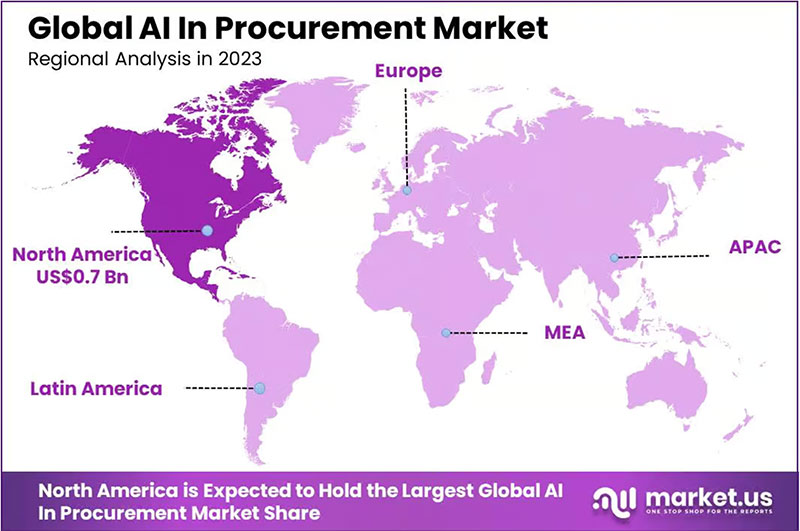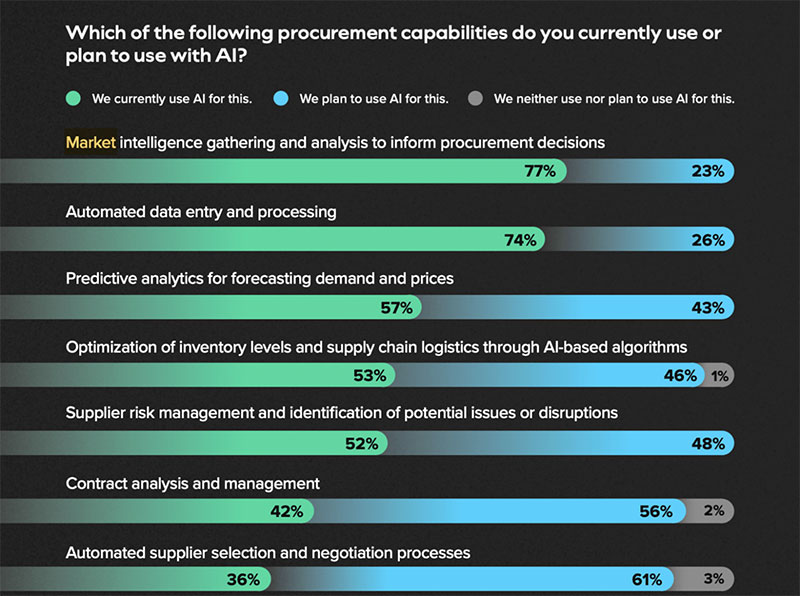人工智能正在改变供应链和采购方式
不用水晶球我们也能预测到人工智能 (AI) 将继续改变电子制造业。有人说人工智能将对工人的效率产生积极影响,也有人担心人工智能会带来不可预见的挑战。无论如何,事情正在迅速发生变化。
采购领导可能会发现,人工智能尤其有助于更准确、更高效、更快速地完成任务,使他们能够更加专注于战略性活动。借助大量的实时数据,他们能够灵活地降低风险,关注供应商之间的互动,并适应不断变化的市场条件。
美国的人工智能采购支出居全球首位
在全球范围内,人工智能在采购领域的应用正在快速增长,预计 2033 年的价值将从 2023 年的 19 亿美元增至 226 亿美元1。这意味着在预测期内 (2024 - 2033) 的复合年增长率 (CAGR) 将达到惊人的 28.1%。2023 年,采购市场中的人工智能软件相对于硬件已占据主导地位,市场份额超过了 69.5%。去年,北美市场占据了最大份额,占 2023 年总份额的 38%(图 1)。
 图 1:2023 年,在快速采用和技术进步的推动下,北美采购领域的人工智能收入将达到 7 亿美元。(图片来源:Market.us)
图 1:2023 年,在快速采用和技术进步的推动下,北美采购领域的人工智能收入将达到 7 亿美元。(图片来源:Market.us)
其他的消息来源也印证了这些令人乐观的发展。根据人工智能咨询公司 Zipdo 的研究,57% 的专业采购人士认为,到 2025 年人工智能将对该行业产生重大影响。2 已有超过三分之一的企业组织在一定程度上使用了人工智能。采购部门正在引领这一潮流,预计在未来两年内,人工智能在这一领域的应用将增加 55%。
进行采购工作
根据 Airbase 的一项调查,人工智能的应用将会迅速增长,而且已有 96% 的专业采购人员在日常工作中使用了人工智能。最常见的使用案例包括:
- 市场情报收集和分析 (77%)
- 数据的自动录入和处理 (74%)
- 预测分析(57%)
- 库存和供应链物流优化(53%)
- 供应商风险管理(52%)
- 合同分析与管理 (42%)
- 供应商选择和谈判流程自动化(36%)
对于人工智能目前能够完成的最常见任务来说,人工智能的采用率超过 97% 在不久的将来将成为现实。3 各企业组织普遍计划将人工智能用于采购领域最常见的人工智能应用中(图 2)。即使在选择供应商时,用的最少的人工智能功能也在所有受访者的待办事项清单上,只有少数例外。
 图 2:各企业组织普遍计划将人工智能用于采购领域最常见的应用中。(图片来源:Airbase)
图 2:各企业组织普遍计划将人工智能用于采购领域最常见的应用中。(图片来源:Airbase)
生成式人工智能
与此同时,人工智能技术将不断进步,进一步提高电子设备制造商的采购能力。例如,生成式人工智能 (GenAI) 可以从大量数据中学习,并根据提示或输入模仿数据创建新内容。其结果可能是人类语言、编程语言、艺术、化学、生物学或任何复杂的学科。市场研究公司 Gartner 认为,对于专业采购人员来说,在代理推理、多模态和人工智能代理方面的进步最有可能影响采购方式。4
顾名思义,GenAI 中的代理推理允许采购系统进行模仿人类认知的高级决策过程。复杂的采购场景需要人工干预,但人工智能可以结合各种来源的数据并对其进行分析,从而快速、准确地做出明智的决策。
多模态是指人工智能整合、处理多种格式数据(如文本、图像和音频)的能力,且有望使 GenAI 的功能对用户来说更加直观。采购部门将能够收集、分析更多样化的信息源,从而获得更全面的洞察力,制定出更明智的业务战略。
人工智能代理可自动执行任务,并代表人类做出决策。这些代理可以执行基本的采购功能和活动,使专业采购人员能够腾出手来解决问题或执行复杂的任务。
虽然提高生产力的潜力显而易见,但隐私问题依然存在。原始设备制造商必须努力应对不断变化的数据管理方法和隐私政策、实践,以确保其实施的人工智能具有适当的保障措施。2025 年,围绕这一问题的活动可能会很多。
随着人工智能的发展,无疑将继续加强供应链中的采购活动。不久的将来,“机器”买家将成为常态,采购团队就可以专注于供应链中的战略和关键活动。
参考文献
1: https://market.us/report/ai-in-procurement-market/
2: https://zipdo.co/research/ai-in-the-procurement-industry-statistics/

Have questions or comments? Continue the conversation on TechForum, Digi-Key's online community and technical resource.
Visit TechForum







